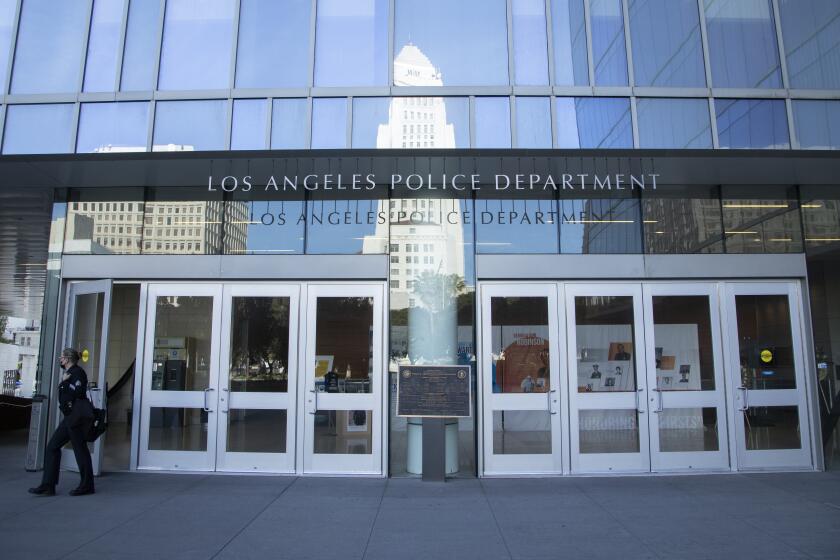Together in Tragedy : Growing Support Group Shares the Pain of Families and Friends of Young Slaying Victims
Francisco Cuellar would have spent this pleasant spring night with his girlfriend, Cynthia, at the senior prom.
His mother would have fussed over them and taken pictures. His stepfather would have straightened Francisco’s tie and given him last-minute advice.
But on this crisp night in May, there were no family snapshots. No tuxedo. No man-to-man talk. No dance.
Instead, Francisco’s mother sat in a home in Granada Hills describing how her only son was killed outside a store in Sun Valley.
“I heard the shots,” Victoria Alcantar said through tears. “I heard him being killed.”
After Francisco’s death, Alcantar needed help sorting out her feelings and dealing with the often tedious court proceedings of her son’s accused killers. She found it in an organization created by a tragic but growing demand: Parents and Siblings of Murdered Children, a support group for families and friends of young slaying victims.
Once a month, members gather to share coping techniques and to comfort and console each other. Often they lend their support by attending the trials of the accused killers of other members’ children.
“We’ve become like a little family,” co-founder Priscilla Renteria said. “It’s a sad way to meet people, but that’s the way it turned out.”
Renteria helped found Parents and Siblings of Murdered Children--believed to be the only Valley-based group of its kind--after her own son, John Avila, 19, was killed by gunmen in Mission Hills.
“I never thought anybody could help me,” Renteria recalled. “I thought no one . . . could know what I’m going through.”
But Renteria attended sessions of a similar support group in Palos Verdes and was helped by the discussions.
After learning that there was no such Valley-based group, she began one last year to share what she had learned with others and in memory of her son. Despite its name, the nonprofit group is open to all family members and friends of slaying victims.
One recent night, 11 people met in the living room of Renteria’s home.
Sitting in a circle, on couches and in chairs, they spoke candidly about the daughters, sons and mothers who were violently and abruptly taken from them, and about how their lives have changed since the deaths.
They tell similar stories of “good days,” when life seemed somewhat normal, and of hard days when the fragile peace they’ve made with their fate seems to fall apart. As always, the meeting started with chilling introductions that have become commonplace.
“My name is Ida Martinez,” began one woman, fumbling with a tissue. “And my son, Hector, was murdered March 20, 1990.”
For some, even the act of saying that a loved one was murdered is therapeutic, Renteria said. In the group discussions, members can express a spectrum of feelings--anger, frustration, guilt and despair--to listeners who have experienced the same trauma.
“In sharing other people’s pain, it helps you to understand your own,” said Michael Shanks, whose mother, Barbara Shanks, was beaten to death in 1989.
But Ida Martinez can say no more, tears well in her eyes and she motions for another person to begin.
When it was his turn to speak, Toby Martinez finished recounting the incident that his wife, Ida, still has difficulty talking about.
Martinez stared straight ahead, arms folded as he recalled the night of his son’s death.
“What really hurts,” Martinez said calmly, “is that he died in my arms.
“I’ve seen a lot of men die. I was a platoon sergeant in Vietnam. It’s not the same.”
Hector Martinez, 19, was killed during a gang fight outside a market in Pacoima on March 20, 1990.
Michael Torres, 27, of Sylmar and David Martinez, 27, of San Fernando beat and stabbed the unarmed teen-ager to death after Hector and two others chased the men, prosecutors said.
Torres and David Martinez had been charged with murder but pleaded guilty to a lesser charge of voluntary manslaughter in San Fernando Superior Court earlier this month.
As with others in the group, the Martinezes said the pain of their son’s death was compounded by their experience in court. They do not believe justice was served.
“I trusted the system,” Hector Martinez said, “and it slapped me in the face.”
Later, Ida Martinez shared her memories of Hector; how he talked of getting a good job so he could move the family away from the gangs and drugs in their Pacoima neighborhood, and how he wrestled with the dilemma of gang membership. “He would say, ‘You’re dead if you do and you’re dead if you don’t,’ ” Martinez recalled, her voice thick with emotion. “What am I supposed to do, Mom?”
In the group there is an alternating sense of support for police and the courts in the fight against crime, and criticism of a system so overloaded that members’ loved ones become “just another statistic.”
Eloise Luera supports the police and the legal system, but has a firm belief about what should be done to the killers of her son.
“I want them dead,” she said flatly.
Luera’s 19-year-old son, Richard Davis, was killed Sept. 17, 1990, by two men who answered a newspaper ad that Davis ran to sell his 1973 Datsun 280-Z. They then shot him during a test run. Kent Derek Parrish of West Los Angeles is serving a prison term of 27 years to life for killing Davis. Ronald Lewis Fort of Culver City received a sentence of 26 years to life.
Although Luera said she has been criticized by some for supporting the death penalty, she offers no apologies for her stance. In the group, none are demanded.
“You have to do what is right for you,” Luera tells the group. “We are all functioning as normally as we can in a very abnormal situation.”
Group members tell of holidays that now carry little meaning and of once-anticipated events that now serve only to remind them of their loss.
Like Francisco’s dance.
“This was supposed to be his prom night,” Alcantar told the group. “He was an honor student. He was supposed to graduate next month.”
On Jan. 12, Francisco Cuellar was gunned down by suspected gang members at Jerry’s Liquor Store near his home in Sun Valley, prosecutors said. Alcantar found Francisco “lying in a pool of blood.
“I was thinking this cannot happen. . . . My baby cannot be dead,” Alcantar said “Then I thought ‘Why? Why my son?’ ”
When Miguel Magana, 19, was ordered to stand trial last month in San Fernando Superior Court for Francisco’s death, Alcantar was there. Fellow group member Marina Contreras went with her for support.
Alcantar and her husband have since moved from their home near the scene of the killing, but Alcantar has arranged all of Francisco’s belongings in a room in the new house, just the way he left them in their former home.
“I couldn’t throw anything of his away,” Alcantar explained to the group. “There are days and nights when I just sit in his room . . . . “ The others nodded knowingly.
“The group is growing,” Luera said. “That just means one thing: more and more people are being murdered and changing our lives.”
More to Read
Start your day right
Sign up for Essential California for news, features and recommendations from the L.A. Times and beyond in your inbox six days a week.
You may occasionally receive promotional content from the Los Angeles Times.






